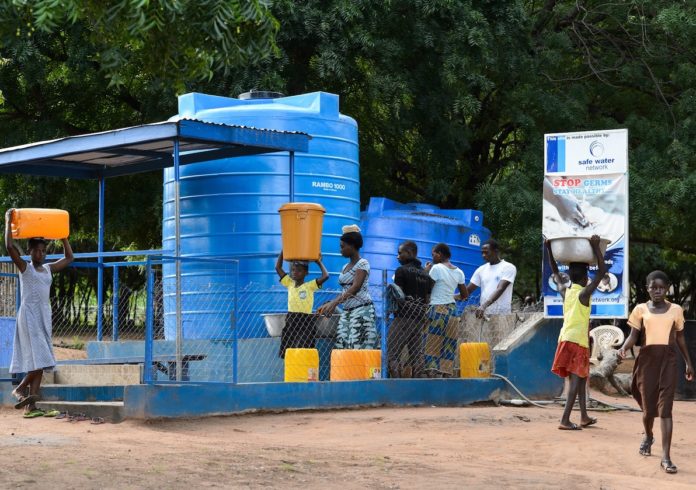George Bauer and Akanksha Sharma of the GSMA highlight the water opportunities with mobile communications
“There are several channels through which mobile technology can impact utility services. One of those channels, which is a huge opportunity obviously, is mobile payments,” says GSMA Mobile for Development (M4D) Utilities advocacy manager, George Bauer. “With the rise and growth of the mobile money ecosystem over the last few years, there is an incredible opportunity for mobile payments in the water sector as a remote and secure payment method and a digital record of payments.”
He notes that machine-to-machine connectivity is also leveraged for uses such as smart metering, using GSM networks, and the remote control of systems. For example, a system can be switched off remotely in the case of non-payment. Traditional mobile services such as voice, SMS, and apps are also key; for example, in coordinating logistics in supply chains, customer support, or reporting the abuse or manipulation of infrastructure.
Another important channel is the way water service providers can leverage the sales distribution and branding of a mobile operator. “Especially in rural areas, the utility service provider might not have such a big ground game. They could, possibly, take advantage of the ground game of a mobile operator, to have more reach, or the branding, or the distribution,” he suggests. Successful examples of projects leveraging help include CityTaps and Kampala City Authority (see box).
Achievable options
Much can be achieved with today’s technology. GSMA M4D Utilities senior insights manager Akanksha Sharma explains: “Mobile technology has seen quite an evolution from analogue services to the 5G now being tested in some developed markets. But in emerging markets, simple technologies such as SMS and interactive voice response systems are being used over 2G and 3G networks to enable access to a variety of basic services – water, sanitation, energy, agriculture, health and education, amongst many others. Sub-Saharan Africa has been the world’s fastest-growing mobile region in recent years. It has been the birthplace of mobile money, which started 10 years ago from Kenya, and now processes over a billion transactions every day!”
Sharma continues: “The use of pay-as-you-go technology in the water sector has also started to pick up. The fundamental challenge with water is that it is a human right and people are not used to paying for water. It is a conundrum, and it comes down to, ‘Can you ask a person to pay for water? If so, what would be the best price point there?’ These questions are still unanswered and need to be sorted first.”
George Bauer adds: “What we’re finding across our work is the challenge of replicating successful digital and mobile-enabled use cases. Digital solutions cannot be regarded in isolation; they have to be analysed in the context in which they’re implemented.”
Bauer believes that digital literacy, the income level of end users, the cost of importing technical hardware, the evolving regulatory environment, and entrenched interests must all be taken into account when implementing digital solutions.
The M4D Utilities programme strives to unlock a commercially sustainable business model with mobile technology, to deliver affordable and improved energy, water and sanitation services in emerging markets.
Bauer explains: “For national and local governments, it’s important to be willing to take risks on innovation in utilities. That can mean, for instance, a utility provider being willing to run a pilot.”
The way utility service provision is being undertaken in developing countries is a fundamentally different process to developed countries, he believes. That means different attitudes are needed with regards to commercial sustainability and willingness to pay, and it is also necessary to think about how to create commercially sustainable water service models.
One key aspect is government supervision. As Bauer says: “It’s definitely the case in all of the three sectors that the M4D Utilities team works in, energy, water, and sanitation. There is no way to think about these sectors without thinking about government and government oversight.”
The GSMA M4D Utilities programme
The GSMA represents mobile operators worldwide, uniting more than 750 operators and 350 companies in the wider ecosystem. Within the GSMA, the Mobile for Development (M4D) team drives innovation in digital technology to reduce inequalities.
In the water sector, one successful example of a venture funded by GSMA’s M4D Utilities Innovation Fund is CityTaps in Niger. This company works with national water utility SEEN (Société d’Exploitation des Eaux du Niger) providing a pre-paid smart metering solution in partnership with mobile operator Orange Niger. CityTaps is now scaling a similar partnership in Burkina Faso in partnership with the local water utility and Orange Burkina Faso.
The GSMA M4D Utilities programme has also worked with Kampala City Authority (KCCA), a sanitation grantee, to expand an existing GIS map of all city sanitation facilities, connecting pit-emptying entrepreneurs to the pits that need to be emptied. KCCA can see how frequently pits are emptied and can act on this by, for instance, telling their fleet of pit emptying entrepreneurs to visit a certain neighbourhood.
The programme is also trialling a mobile payment solution for pit emptying entrepreneurs. The entrepreneurs can receive money from their customers via mobile solutions and also receive payments from the follow-on stage in the value chain. The platform also allows them to identify the closest faecal sludge management plant and so creates an additional revenue stream.
In Kenya, another grantee, Wonderkid, provides billing, customer management and revenue management solutions to four water utilities. They set up a complaint management and tracking system, and implemented a self-meter reading and payment system. As a result, KIWASCO, the water utility in Kisumu, recorded a revenue increase of more than 28%.
More information:
‘Key trends in mobile-enabled water services: What’s working and what’s next’, by Akanksha Sharma, GSMA
‘Mobile for Development Utilities Annual Report 2019 – Intelligent Utilities for All’, GSMA
GSMA M4D Utilities Innovation Fund: see www.gsma.com/mobilefordevelopment/m4utilities/utitlities-innovation-fund








